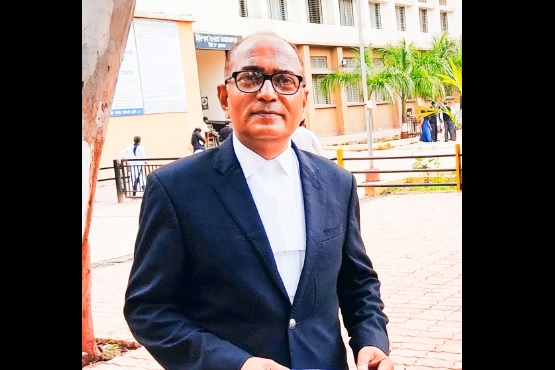How to become a good lawyer: Be a great actor with skills to draw attention, convince and make your mark

Shahid Parvez Sayed
NewsBits.in
AURANGABAD: Go to any trial court near you and observe as lawyers make submissions in the courtrooms. Amidst the chaos, the confusion and steady flow of 'accused' persons, notice how many of these lawyers were able to hold your as well as Your Honor’s’ attention.
How many were able to penetrate the defenses of your heart and mind and got hold of your entire being. Hardly a few. Majority came, mumbled a few words and went away. So, what was special about those that lawyer who had a ‘Court Presence’, and was putting mind-boggling arguments?
Simple, he was actually acting. Hold on before your conditioned mind considers acting as a juvenile act. But before we speak more about this, it becomes pertinent to mention this personal-little experience.As a rookie law school intern, I had the chance opportunity to observe a senior lawyer arguing his case in the district and session court Auranagabad.
I noticed perfect voice modulations as the occasion demanded—he would sometimes take a long pause, sometimes resort to raising his voice while lowering it at other junctures. At another time, he would pronounce a word with additional emphasis while he directly looked into the eyes of the respected judge.
ACTION IN THE COURT ROOM
Since I have had the privilege to hear him outside the court, I knew that was not his natural way of speaking. Is he acting, I wondered. If so, why? In any courtroom, lawyers from both sides cancel each other out and decrees are delivered on the basis of facts, evidence supporting those facts, and the legal precedents on the matter. But, that is not all.
In a case with everything being equal, a lawyer with real advocacy skills will win the day for his client. Real advocacy is a subject which involves personal and soft skills, backed by nuances they only teach in fancy acting schools. There are many methods employed by lawyers to argue a case and get the results in their favour.
But facts alone don’t necessarily help you win a case. Judge or Jury is more likely to believe in your case if they believe in you. Honourable Herb Stern, former federal judge, wrote: “I believe that the greatest weapon in the arsenal of a trial lawyer is not the law or even the facts. It is personal advocacy, coupled with personal standing with the jury.”
Personal advocacy includes all elements of one’s personality --- from articulation to appearance, and from deportment to etiquette. According to Hon’ble Justice Akhil Kureshi, former chief justice of the Rajahsatan High Court, gentle persuasion --- of both the logical and the emotional kind ---is the best method to use while arguing a case before a judge.
Back up the logical element using legal reasoning, facts and case laws. That is quite straightforward—the law school prepares you quite well for that. It is the emotional persuasion where you need to first acquire and then master tricks of the trade of the prescribed to actors.
TRICKS OF THE TRADE, THE BASICS
A lawyer is nothing but a messenger of his client’s grievances and agonies. The better she is at conveying those pleadings, the better lawyer she will be.
Imagine a public prosecutor arguing for a death sentence in the Nirbhaya rape case with a flat face or a prosecutor arguing for death for someone involved in the World Trade Centre attack case without conveying through her words and emotions the pain and loss of the families who lost their loved ones that day.
While lawyers are taught to be good at logical thinking and reasoning, the emotional elements of arguments are often overlooked. Remember how Johnny Cochran, the celebrity lawyer of O J Simpsons, used the race card and associated imagery to convince the majority of the African- American jury that police personnel are racists and everything they have put up as evidence could not be trusted.
He created doubts in the minds of the jury and aroused their defense mechanism against racism in America and was able to get his client out. In case, one is lacking in any of the aspects of persuasion, good-old Aristotle comes to the rescue. He has listed three elements of persuasion:
*Ethos: Through your appearance and personality, you must come across as trustworthy, backed by your education and professionalism.
*Pathos: Must appeal to the emotion of the audience so that they are inclined to accept your arguments.
*Logos: You must provide legal and rational arguments to bolster your case.
What are the common skill sets needed in lawyers as well as actors? 'Communication, Voice, Credbility, Pace, Emotions, Appearance and Logical Reasoning'. Apart from perhaps the last, logical reasoning, a lawyer and an actor work with the same devices to win over their audience. Winning the audience is the aim of the lawyer as well as the actor.
Once you win your audience, the verdict is likely to be in your favour. It is not a coincidence that verdict is the term used to describe the outcome of a performance in a theatre and end result of a pleading in a courtroom.The major difference is that a courtroom has an audience of one in the form of a single judge, while a theater has many judges.
A great performance comes down to communicating effectively. Advocacy is all about two-way communication. So is acting. It requires the one in charge to pick up the clues and to assess the arguments/ performance as the proceedings move along. It requires thinking on one’s feet and quick course corrections if things are not going one’s way.
My first argument in court happened a few months after graduation. Being a first timer, I had apprehensions about my performance in court. Nevertheless, I did my research and thought of the flow of my arguments. Since I was representing the father of a boy who had committed suicide and two people were accused of abatement to suicide, my natural tone came out to be of anguish and anger.
Throughout my argument of 25 minutes, I gave some anxious moments to the senior opposing counsel with 30 years of experience as the court listened to me with a great deal of intent. I lost my case but won many admirers that day.That way, I have the first-hand experience of using emotions in conveying the grief and anger of the client. It works.
The judge was persuaded on that day. He kept on asking for a citation, which I could not actually provide. I thought that I am about to create a precedent. Not all learned Counsels agree with this sort of notion though. Some, in fact, advise against it while others are all for it.
“Strictly speaking, lawyers are not actors but demonstrators of facts and law, calling upon the courts to act on their demonstration and submissions, which sometimes to the general public seems like acting,” says SR Nehri, senior lawyer, district and session court, Aurangabad
“If a lawyer is not an actor, then he is not a good lawyer,” says lawyer SN Deshmukh of the same court. It seems like this debate has a generation gap divide, with seniors feeling differently about the equation and the younger generation admitting the similarities between the actor and the advocate.
THE KNOCKOUT PUNCH
Great lawyering is a combination of many skills and broad knowledge about not only law but also history, philosophy, psychology, humanities, sociology, finance and fine arts. Acting is part of a fine art and a great lawyer will use all the resources at his command to win the case for his client.
Psychology says when a person rises to speak, their acting skills get activated when there are listeners. It happens at a subconscious level at times without the speaker even realizing it. When we speak to an individual and when we speak to a gathering, we speak differently.
We take more pauses; we speak clearly and slowly realising that the audience may not hear properly if we speak like we speak in an informal setting. Acting skills of any speaker gets enhanced with a greater number of listeners. A story from the Arabian Night is worth quoting here. When Aladdin ultimately reaches the treasure trove, he utters the mantra that alone can open the mighty gates.
Khul Jaa Sim Sim! Many like Aladdin had uttered very same Mantra to open the gates of the cave but perished without any success. It turned out, the magic to open the gates did not just lie in the mantra but also in the ‘tone’ and the ‘voice ‘in which it was spoken. Fortunately for Aladdin, he had it all. That’s exactly what we lawyers try to do with lawyering /acting skills: to open the heart of the judge and the jury and to claim the treasure and the win for our clients.
Each time. Every time. One case at a time!
References:
1. Advocacy, Andy Boon and Julie McFarlane
2. The making of a trial attorney, article by Hon’ble Judge Lon E. Farris, Prince Williams County Court
[Shahid Parvez Sayed holds the degree of BE, MSCE (USA), MBA (USA), LL.B (India), D.M.J.&F.S. (India) and is practising in the Bombay High Court, Auranagabad Bench]









